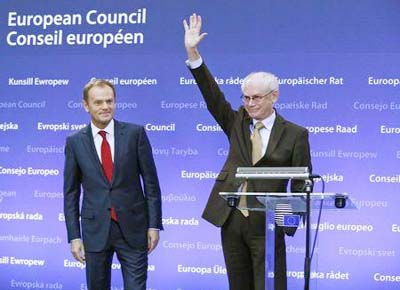
Reuters, Brussels :Short, snappy and focused on two priorities – reviving sagging investment in Europe and standing firm towards Russia, the first European Union summit under new leadership was a demonstrative break with the past.Donald Tusk, the former Polish prime minister who took over the chairmanship of the 28-nation European Council this month, put his briskly opinionated stamp on the meeting of EU leaders, sending them home a day early after a show of unity and purpose.In his first month, he has shown he intends to be a major player in EU foreign policy, driving an Atlanticist agenda of free trade with the United States, partnership with NATO, toughness with Russia and cautious cooperation with China.German Chancellor Angela Merkel, the most powerful EU leader, was delighted with the first steps of her protege, a fellow conservative from a country which like her native East Germany cast off Soviet Communist domination in 1989. She praised “a shorter, more succinct, well organized Council meeting under our new president Donald Tusk”. Indeed Tusk opened the summit without Merkel and French President Francois Hollande after they kept other leaders waiting while they met in private, participants said.Departing from the self-effacing, consensual style of his Belgian predecessor Herman Van Rompuy, Tusk made clear publicly in advance he wanted a firm line on maintaining economic sanctions on Russia, which he called “our strategic problem”. The former Solidarity student union activist and anti-communist political organizer said Europeans should regain their self-confidence and realize their own strengths.”The biggest challenge today is the Russian approach, not only to Ukraine but also to the EU,” he said.One EU official described the contrast between Van Rompuy and Tusk as “old school versus business school”, although the Pole is a political bruiser rather than an economist.When ambassadors met the next morning to review the new summit format, there was unanimous praise for Tusk’s strict chairmanship, which returned the European Council to its intended role of giving strategic guidance to the EU on a handful of key issues instead of a laundry list of problems.He prevented leaders making long speeches or getting involved in rewriting the final statement, as often happens.”They were happy the drafting was left to civil servants and they weren’t asked to get involved,” an EU diplomat said. Whether that discipline will hold when serious issues of money and power are at stake remains to be seen.Tusk’s clear line on Russia masked differences between hawks who want to maintain or step up sanctions, and doves such as France and Italy, keen to ease them at the first sign of Russian cooperation to stabilize eastern Ukraine.

